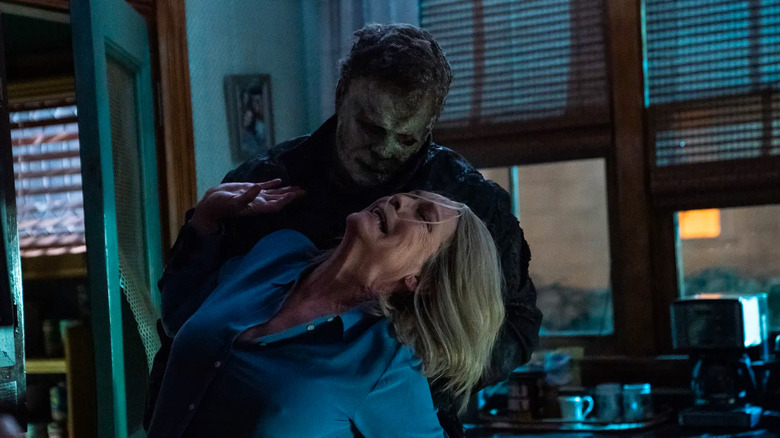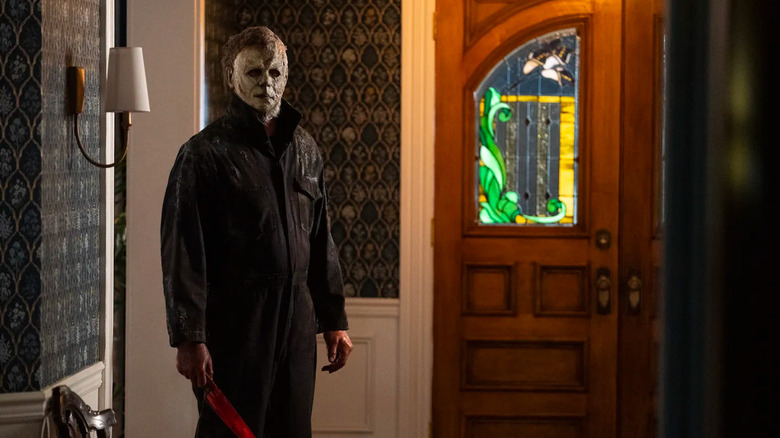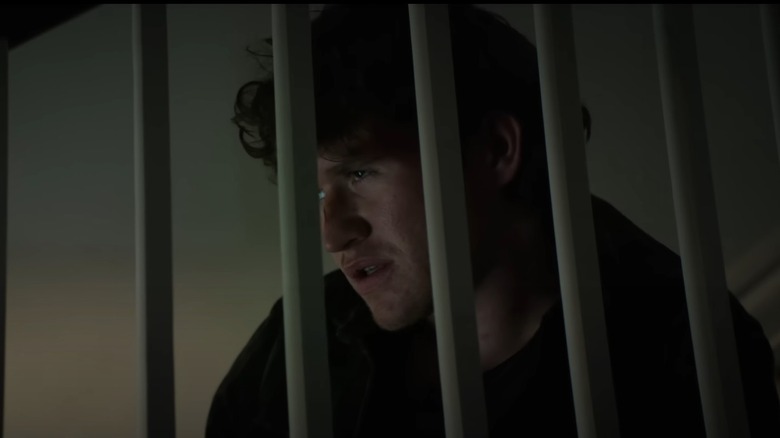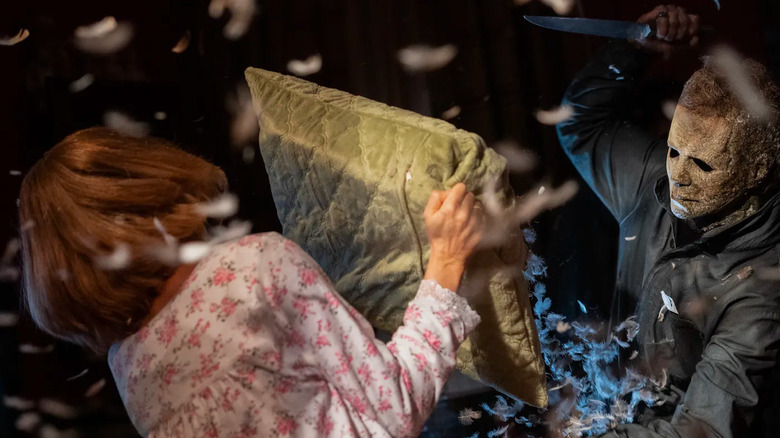Halloween Ends Review: Good Performances And A Strong Finale Can't Save An Undercooked Story
As far as well-loved horror franchises go, "Halloween" has one of the most complex legacies a fright-loving fan can find. John Carpenter's 1978 "Halloween" still stuns, Jamie Lee Curtis' Laurie Strode is one of horror's greatest protagonists, and Michael Myers remains one of the most mysterious and terrifying horror boogeymen ever invented. On the other hand, the franchise is both blessed and cursed by the myriad resets and timelines that various filmmakers have concocted over the years. Do you want the elegant route of "Halloween," "Halloween II," then "Halloween H20: 20 Years Later," and possibly (I'm so sorry) "Halloween: Resurrection"? Do you want to lean into cults and the supernatural, and experience the Cult of Thorn outings with films 4-6? There's also the option of the Zombie remakes, or even watching the original and jumping to "Halloween III: Season of the Witch" in what I call the "Ode to Masks" timeline.
With all this wide variability in timelines, interpretations, and mask quality, when David Gordon Green announced that he'd be helming a new Halloween film, building into a trilogy that extends from the original only and into a final wrap-up of the conflict between Laurie Strode and Michael Myers, it was anyone's guess how the trilogy would end. What would his take on Michael Myers' ever-changing legend be? Central to the project is a need for the trilogy to find its own answer to the series' biggest question: what is the nature of evil-incarnate Michael Myers? The origin and nature of his evil, his connection to Laurie Strode, and even Myers' mortality have all been hot topics of conversation, and there's no way to approach the series without having some stance on those issues at least in mind.
John Carpenter's own approach to "The Shape," the inhuman name by which the original film's opening credits refer to Myers, is that the nature of his evil and imperviousness to damage should remain mysterious: it's highly possible he's evil incarnate, but never truly settled. In David Gordon Green's hands, the question of Michael Myers is teased and toyed with, but Green has stated firmly that Myers cannot do the impossible. Checkmark for the "human" column. As a result, "Halloween Ends" brings finality to the trilogy and closure for its protagonists, giving us Green's answer to these questions once-and-for-all. It boasts good performances from its central characters and a strong intro and conclusion, but the route to that conclusion has logic and character issues and writing that often feels rushed, ending Green's trilogy on a muted note.
A mixed bag of performances with strong leads
Green's trilogy has largely been fascinated by two central themes. First, the series focuses on the impact of trauma, central to the story of Laurie Strode. Second, it highlights the damage that evil brings to a community, what I call the "contagion approach" to Michael Myers. Here, Myers' legacy isn't his individual ills and kills per se, but their impact on bringing out the darkest elements of the community. Myers isn't a man or evil incarnate, he's a disease. At the conclusion of "Halloween Kills," we see Myers survive the entire town of Haddonfield, IL picking up weapons and seeking to kill the masked baddie. Over the course of that film the townsfolk gather, rampage, find their worst selves, and brutalize Michael Myers until he returns the favor and escapes. Whereas "Halloween Kills" is concerned with the impact of Myers on Haddonfield writ large, "Halloween Ends" highlights his corruptive influence on one individual: Corey Cunningham (Rohan Campbell).
At the beginning of "Halloween Ends," Michael Myers has been absent for years following the events of the prior film. In the interim, Laurie Strode has worked on healing from the death of her daughter Karen (Judy Greer) in the prior outing, with Laurie raising her granddaughter Allyson (Andi Matichak) and writing a memoir of her lessons from a lifetime of trauma and resilience. Allyson too has been recovering. She falls for Corey Cunningham, a young man who years prior accidentally killed a child while babysitting, and who proceeded to be demonized in Haddonfield. We watch as Corey is bullied, assaulted, left for dead, and saved and gradually tutored in the murdering arts by what remains of Michael Myers, all the while falling for Allyson.
Newcomer Rohan Campbell is genuinely good with what he's given here, landing both the character's sweet original self and his darker turn as the film progresses. Curtis is of course electric whenever she's on screen, and Matichak continues giving Allyson the rest of the film's best performances. All three major players give solid performances but are somewhat hampered by gaps in logic in their character's choices. The rest of the characters are, minus the excellent Will Patton as Deputy Frank Hawkins, bizarrely reduced to caricatures. Various townspeople stop Strode to harass her on more than one occasion, each time seeming like they were given one take with instructions to be outlandish, while other characters were given sometimes laugh-out-loud moments of dialogue (this film will forever be associated with the phrase "I hope you find love").
Characterization issues and story issues hamper its potential
While the film's central performances generally work, it's ultimately the script's logic that weighs things down. "Halloween Ends" is smartly bookended by the film's two strongest scenes — I won't spoil them, but they boast action and suspense while tying down key parts of the overall narrative for major characters. After the introductory scene, the first act largely feels rushed. We get a lot of time with Corey and his character's set up as town pariah, as well as Laurie Strode being widely blamed for Myers' murders, but the entire first act flies by too quickly: a bundle of short scenes, too-quick transitions, and too-quick plot progression with little time to breathe. That pacing gets a little better as things progress, but it's a major stumbling block.
As Corey becomes a major character, the story stops making sense. To reinforce his growing connection with Myers, "Ends" takes pains to establish that Corey was good and his earlier act of killing a child was an accident. A little bit of on-screen trauma later and he quickly builds towards becoming properly villainous. While in-world time is passing, it still feels like it's all happening with tremendous speed, and furthermore, the pivot doesn't make sense. Corey could truly be initially good, as is regularly established, which makes his setup tragic but fails to explain the ease and speed with which he becomes a villain. If he has an evil heart from moment one, it makes the refrain that he was good all the more confusing. We're left with too quick character transformations that don't quite work. His simultaneous romance with Allyson is also strange because, while she has good reason to expect his goodness, he's an odd duck that's often worrisome and aggressive ... if Allyson falls for the dangerous, troubled type, perhaps establish it better?
What's worse is the characterization of Michael Myers. We discover that after his epic "Halloween Kills" rampage, the one that seriously teased he was becoming something else entirely, Myers slinked off into the city's underbelly for years to do nothing until he was discovered. While "Kills" ends teasing Myers' possible transcendence, "Ends" backtracks to instead reinforce his human fragility. It's a pivot that's pretty boring, and it violates what makes the character most interesting: Myers' ambiguity. Beyond the silliness of that reversal, we also have a wildly inconsistent portrayal of the character. At times he's frail, easily knocked down, his mask stolen, a veritable Sad Boi Michael Myers if ever there was one. Later, sometimes even in the next scene, he's back to the impervious murder machine that can lift a person with one hand and pin them to the wall with a knife. It's a film that really wants to force Michael Myers into humanness but doesn't know how to do it, and it spends most of the plot building his successor without a proper set-up, just to render it all meaningless in one odd moment. It reads like a film that's being written as it was filmed, and it really is too bad ... we'd have been better off having a sequel that took an extra year to congeal but landed.
Halloween Ends gives a fitting finale with an inadequate setup
"Halloween Ends" builds towards a stunning finale. At the same time, the journey to get there is extremely messy. While the buildup of Corey's villainous journey happens too easily and too quickly, his budding connection with Myers takes a pivot that keeps it from actually mattering at the end. It's a film that really focuses on Corey more, at times, than Michael Myers or Laurie Strode, which is odd for the supposed final film in the series.
In a key moment (you'll know it when you see it), Corey's actual motivations make little sense, and it leaves the impression we were all following his path to the dark side for no reason at all. Michael Myers' arc is little better, being weak or strong when convenient and seriously undermining a character that's managed to be menacing through so many other outings. The pace is messy. The logic often fails to track, and things just happen, plots pivot, as though they're being written as they're being filmed.
"Halloween Ends" settles the series' score, but it does so in a way that lacks a central logic and that spends an inordinate amount of time on things that fail to matter. It becomes clear in Green's arc that the intent was to tease an evolving Myers in "Kills" before decimating the character's power in "Ends," with the tragic side effect of cheapening the conclusion of Laurie Strode's story. In the end, "Halloween Ends" boasts strong performances and a great set of first and final scenes, but it is still a "Halloween" outing that sacrificed Michael Myers' mystery, the series' most interesting asset. We're regrettably given a cheap finality that doesn't have the set-up it deserves, in a trilogy capper that feels rushed in every way.
/Film Rating: 5 out of 10



